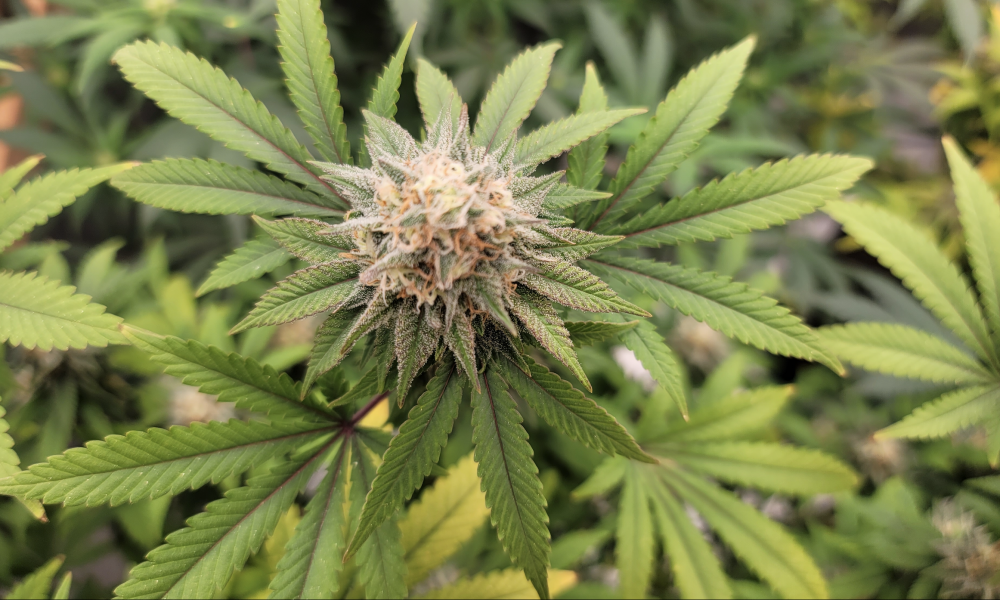The governor of Colorado says that while marijuana reform is “not really a partisan issue” anymore, there are still “stodgy nanny state Republicans who want to control it.” Meanwhile, he says, ongoing prohibition has inhibited research into the science of cannabis that’s kept it strictly criminalized at the federal level.
Gov. Jared Polis (D) is hoping that will change sooner rather than later. He and the governors of five other states sent a letter to President Joe Biden this week, urging officials to reschedule marijuana under the Controlled Substances Act (CSA) by the end of the year.
In an interview that aired on Fox News Radio’s “The Guy Benson Show” on Thursday, Polis said he would’ve liked to see a federal policy change five or 10 years ago as states such as Colorado enacted adult-use legalization, but he theorized that prohibition itself created a “chicken and the egg” situation that has effectively stymied reform by making it harder to conduct research on the effects of cannabis, a stalemate that has been reinforced by congressional politics.
The administrative marijuana scheduling review that Biden directed last year could help break that policy logjam, he said. The U.S. Department of Health and Human Services (HHS) has already determined that cannabis should be moved from Schedule I t0 Schedule III, and now it’s up to the Drug Enforcement Administration (DEA) to make a final determination.
“I don’t know!” Polis exclaimed when asked why it’s taken so long to get to this point. “I think it should’ve been done five to 10 years ago.”
“Now, part of the problem is, while marijuana was illegal, it’s been hard to have the research that was needed to be able to make the case based on data,” he said. “But now there’s a sufficient body of research to do this. I mean, I don’t think it even goes too far out on a limb. There’s plenty of background.”
“The only legitimate reason” for the delay is that “it took a while for the research to catch up with the reality, because of the chicken and the egg,” the governor said. “I mean, you couldn’t you couldn’t get academic-funded research because they couldn’t touch the stuff. So I think we’re getting through that and there’s enough data there to support this reclassification.”
To that end, HHS did release a trove of documents this week related to the scientific review it carried out before making its marijuana rescheduling recommendation. While the material is largely redacted, it speaks to the availability of existing research the agency was able to assess that support the therapeutic potential of cannabis.
Moving cannabis to Schedule III wouldn’t federally legalize it, of course. But Polis pointed out that the modest reform would help normalize tax policy for state-legal businesses—for example, allowing them to take federal deductions so they’re not forced to pay effective tax rates reaching 80 percent.
Meanwhile, even though the vast majority of states have legalized marijuana at some level, with growing bipartisan support, the governor said partisan politics in Congress has also played a certain role in perpetuating prohibition.
Where do YOU stand on the federal legalization of marijuana for medical use?@GovofCO says it’s time for marijuana to be legal for medical use, and that “the DEA needs to act.” Listen and read the interview below.
🎧: https://t.co/zJx51tymQP
📚: https://t.co/OPQYOEpEz7— The Guy Benson Show (@GuyBensonShow) December 7, 2023
“I mean, there are absolutely libertarian-minded Republican members of Congress that fully support this—but there are also kind of stodgy, nanny state Republicans who want to control,” he said. “Democrats are generally more pro-legalization—there’s absolutely some that are not—but it’s not really a partisan issue.”
“At the end of the day, this should be a matter of personal responsibility and decision-making. That’s what Colorado has chosen,” he added. “We’re just saying, let the federal government respect federalism. Every state doesn’t have to choose to do it, but for those who do, get the federal government out of the way.”
He also argued that, regardless of federal research limitations, it’s well established at this point that marijuana “absolutely has its role” as a therapeutic, meaning it should not be classified as Schedule I, a category reserved for drugs with no known medical value and a high abuse potential.
“Even opioids have a therapeutic use under prescription,” Polis said. “Obviously, marijuana is not nearly as dangerous or addictive as opioids. So it’s simply a recognition of the scientific facts coming out of [HHS]. That’s the recommendation, but the DEA needs to act.”
In September, Polis also applauded the president after HHS made its cannabis rescheduling recommendation—though he emphasized that the initial move must be followed with more action to address cannabis banking, immigration, criminal justice reform and federal enforcement concerns.
That should include developing Food and Drug Administration (FDA) guidance clarifying that it will not interfere in state-legal marijuana activities, he said.
Meanwhile, Polis has also called on lawmakers to take steps to allow him to issue mass pardons for people with prior psychedelics convictions after he signed legislation to implement regulations for substances like psilocybin and ayahuasca in May.
The governor also signed a bill into law in June that allows online marijuana sales. That reform went into effect in August.
He also recently approved legislation that will bolster marijuana-related protections for working professionals in the state—effectively codifying an executive order he issued last year.
Medical Marijuana Growers And Caregivers Can Own Guns, But Patients Can’t, FBI Says In Little-Noticed Memo
Photo courtesy of Mike Latimer.
Read the full article here

